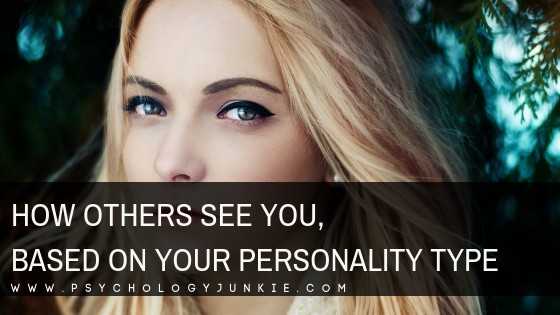How Other People See You, Based On Your Personality Type
Have you ever wondered if your personality type impacts the way other people see you? While each of us has unique traits and qualities that have nothing to do with type, there are certain themes and characteristics that each type tends to display. Let’s take a look at what those are for you!
Not sure what your personality type is? Take our new personality questionnaire here. Or you can take the official MBTI® here.

Estimated reading time: 14 minutes
Here’s How Others See You, Based On Your Personality Type
The ENFP
ENFPs are usually seen as lively, friendly, and open-minded individuals. They bring curiosity and enthusiasm to most encounters and this tends to draw new people to them wherever they go. Simultaneously, they are usually deeply honest and crave a great deal of authenticity in their friendships.
Because ENFPs like an ever-changing, evolving lifestyle, they tend to appear free-spirited and restless. And for all their open-minded, friendly characteristics, they can become deeply passionate when one of their values is threatened.
Healthy ENFPs are seen as:
– Friendly, insightful, compelling
– Spontaneous and creative
– Generous and curious
Unhealthy ENFPs are seen as:
– Hyperactive or scattered – unable to focus
– Struggling to apply logic to their decisions and inspirations
– Frazzled and burned out from following too many paths and being unable to say “no”.
– Worn out from forgetting to take care of their physical needs
The ENTP
ENTPs are usually seen as energetic, curious, and spontaneous. They have a buzz of intellectual energy and a visionary nature that makes them intriguing to others. They are good at mobilizing people to participate in their vision and don’t mind instigating challenging or deep conversations as a way to debate ideas and pose new theories.
Because ENTPs use a process called introverted Thinking (Ti), they can become abrupt and intense when they challenge other people’s logic. They have a tendency to play devil’s advocate, and this can irritate some people, but it is usually a way for the ENTP to connect all the data points in their mind and find out if something is definitively accurate.
Healthy ENTPs are seen as:
– Lively, curious, innovative
– Autonomous and independent
– Insightful, challenging, and logical
Unhealthy ENTPs are seen as:
– Scattered – rushing from idea to idea without accomplishing anything.
– Overly-challenging, abrasive, rude
– Physically burned out or unhealthy from forgetting to take care of physical needs.
The INFP
INFPs are usually seen as private yet kind individuals. Because they value depth and authenticity to such a great degree they are usually selective about who they spend their time with. They often seem mysterious to others because a lot of their vivid, inner world is very private. They are often seen as imaginative, creative, and focused on a future or vision they’d like to see become a reality.
Because INFPs use extraverted Intuition (Ne) they tend to enjoy brainstorming or posing unusual ideas or theories with others. They like to imagine and contemplate “what if” scenarios and get excited by ideas and possibilities for the future.
Healthy INFPs are seen as:
– Introspective, sensitive, and empathetic
– Original and individualistic
– Open-minded yet complex and reserved
Unhealthy INFPs are seen as:
– Overly-withdrawn from people and the world around them
– Overly sensitive or easily offended
– Impractical – struggling to bring their ideas and goals into reality.
Read This Next: 10 Things You’ll Relate to If You’re an INFP
The INTP
INTPs are usually seen as reserved yet curious individuals. They tend to dislike pushing themselves onto other people or delegating or controlling anyone. They tend to be absorbed in several interests at a time and can work with remarkable determination towards ideas that capture their interest. They are usually tolerant of people unless they are pushy, domineering, or their logic is too flawed for them to ignore.
Because INTPs use extraverted Intuition (Ne) they tend to enjoy brainstorming or posing unusual ideas and theories in conversation. They also have a knack for seeing surprising connections and inter-relationships between seemingly disparate events.
Healthy INTPs are seen as:
– Quiet, easy-going, and calm
– Independent and innovative
– Logical, studious, and curious
Unhealthy INTPs are seen as:
– Isolative, argumentative, and critical
– Cynical, pessimistic, and insensitive
– Impractical. May forget mundane duties like paying the bills or taking care of physical needs.
The ENFJ
ENFJs are usually seen as enthusiastic, friendly, and energetic individuals. They are very aware of the needs and feelings of other people and tend to have strong, inspiring communication skills. They are often good listeners and are attuned to unique gifts of individuals they speak to. They also tend to have clear, definitive values and opinions.
Because ENFJs are judging types, they like to have an organized world around them. This doesn’t mean their room will always be neat and tidy, but it does mean they like to have closure in relationships and clear plans. They don’t like ambiguity in their relationships and having a clear plan of action is important to them. They have a strong focus on the future and organizing their time to reach their goals.
Healthy ENFJs are seen as:
– Kind, compassionate, and tactful
– Expressive, responsive, and authentic
– Imaginative, strategic, and visionary
Unhealthy ENFJs are seen as:
– Jumping to conclusions too quickly.
– Overbearing and overly-sensitive.
– Detail-blind. In an effort to reach goals, they ignore logical flaws or miss important details.
Read This Next: What ENFJs Do When They Get Really Stressed Out
The ENTJ
ENTJs are usually seen as intelligent, visionary individuals who like to challenge ideas and theories to reach mutual understanding. They tend to enjoy a good debate because this allows them to bounce ideas off other people and find the truth or new insight. They are fiercely logical and tend to take charge of the conversation if no one else is doing so or if the topics revolve around mundane activities or details.
Because ENTJs are judging types they like to have an organized world around them. They like having a plan, making plans, and reaching conclusions. However, their intuition can draw them into wide-ranging discussions and explorations of various theories and abstract concepts.
Healthy ENTJs are seen as:
– Objective, fair, and logical
– Self-assured, directive, and challenging
– Hard-working, curious, and insightful
Unhealthy ENTJs are seen as:
– Critical and tactless, seeing other people’s needs as less important than their own.
– Intrusive and bossy. Giving orders and making demands without listening.
– Pushy about getting a job done without giving others enough time to process or prepare.
The INFJ
INFJs are usually seen as reserved yet compassionate and caring. Their intuitions are often kept to themselves unless they are with people they trust deeply. They tend to keep part of themselves hidden and may seem “difficult to know.” They usually listen more then they speak, unless the conversation is very moving or stimulating to them, in which case they can speak passionately for long periods of time, seeming more like extroverts than introverts.
Because INFJs have a driving desire to stay focused on the future and global perspectives they can seem distracted if they are involved in a conversation that is focused primarily on day-to-day details. They tend to use metaphor and analogy in their speech more than literal details and this can make them seem confusing to other types.
Healthy INFJs are seen as:
– Intense, authentic, and insightful
– Empathic and compassionate
– Creative, idealistic, and deep
Unhealthy INFJs are seen as:
– Unrealistic. They can be so wrapped up in their ideas that they lose focus on what is actually happening.
– Impractical and out of touch with what is actually possible.
– Pretentious and overly-sensitive.
Read This Next: 24 Signs You’re an INFJ, the Mystic Personality Type

The INTJ
INTJs are often seen as decisive, reserved, and intense. They tend to keep a lot of their creative visions to themselves unless they are with someone they really trust. What will be most obvious up-front is their ability to solve problems, see things objectively, and plan for the future. They can seem hard to get to know because they keep their emotions and insights internalized outside of very close relationships.
Because INTJs have a driving desire to explore new perspectives, particularly global perspectives, they usually get bored with small-talk or day-to-day conversation. They may appear bored or else abruptly change the subject during these times.
Healthy INTJs are seen as:
– Logical, knowledgeable, and insightful
– Conceptual, future-focused, and independent
– Private but open-minded
Unhealthy INTJs are seen as:
– Critical or condescending, especially to those who don’t share their vision.
– Tactless and blind to giving praise or affirmation to others.
– So focused on their vision that they miss practical realities and forget to take care of themselves.
Read This Next: 24 Signs That You’re an INTJ, the Strategist Personality Type
The ESFP
ESPS tend to come across as exuberant, lively, and easy-going. They are flexible, adaptable, and seldom plan ahead. They appear open to any opportunity or activity that life throws at them. Routine and structure irk them, so they’ll get irritated if they are feeling controlled by anyone. They seem full of adventure, fun, and good humor.
As extraverted Sensors and introverted Feelers, ESFPs like to interact and engage with their environment as much as possible. They tend to be physically active and expressive. They also are guarded about their deeper values but crave authenticity in their own actions and the actions of others. They are people who “keep it real”.
Healthy ESFPs are seen as:
– Resourceful, adaptable, and active
– Generous, optimistic, and sympathetic
– Observant, realistic, and specific
Unhealthy ESFPs are seen as:
– Distractable and overly-impulsive
– Over-sensitive and self-absorbed
– Putting enjoyment and fun over personal obligations and responsibilities
Read This Next: What It Means to be an ESFP Personality Type
The ESTP
ESTPs appear confident, energetic, and active. They like to be engaged and stimulated by their environment as much as possible and are always looking out for new opportunities and adventures. Their attentiveness to their surroundings gives them an intense, observant quality. They act quickly in response to incoming information and usually have quick reflexes. Others are drawn to their enthusiasm and good humor and their sixth sense for fun, enjoyable experiences.
Because ESTPs use both extraverted sensing and introverted thinking they are highly attentive to details in their environment and also have a gift for trouble-shooting, weighing pros and cons, and thinking critically.
Healthy ESTPs are seen as:
– Friendly, fun-loving, and energetic
– Adventurous and daring
– Logical, realistic, and attentive
Unhealthy ESTPs are seen as:
– Focusing entirely on excitement and fun at the expense of their responsibilities and obligations.
– Being unable to see the broader implications of their decisions.
– Overly direct and insensitive to the emotions and concerns of others.
The ISFP
ISFPs are seen as unassuming, authentic, and adaptable. People appreciate their sincerity and gentleness and are often drawn to their sense of humor. They tend to appear difficult to know well because they keep many of their values held close to the chest, only sharing them with those who’ve earned their trust.
Because ISFPs are introverted feeling and extraverted sensing types, they combine a need for authenticity and “keeping it real” with a desire for adventure and exploration. They enjoy taking life as it comes and being open to any opportunity that comes their way. As a result, they dislike overly-structured lifestyles or being “caged in” by a lot of rules. They also have very little patience for phoniness and people-pleasing or manipulative behaviors.
Healthy ISFPs are seen as:
– Gentle, sensitive, and empathetic
– Observant, realistic, and practical
– Adaptable, flexible, and spontaneous
Unhealthy ISFPs are seen as:
– Self-critical and overly withdrawn
– Rejecting of logical systems and rules
– Focusing entirely on the current moment without seeing the long-term implications
The ISTP
ISTPs appear observant, logical, and adaptable. They seem to have a confidence that comes from within and a calm ability to handle whatever life throws at them. They don’t feel the need to impose their will on others or win arguments unless their principles are being devalued or someone’s logic is incredibly poor. Overall, they keep a lot of their judgments internalized – they don’t feel the need to quibble with others over their flawed opinions. They tend to have a good sense of humor, which people are drawn to, but many find that they are hard to read or to know well.
Because ISTPs use a mental process called extraverted sensing, they like having their options open and being adaptable to whatever life gives them. They will appear disgruntled and frustrated if they are micro-managed or limited by a lot of external rules and regulations.
Healthy ISTPs are seen as:
– Adaptable, realistic, and observant
– Logical, tactical, and efficient
– Independent, self-determined, and adventurous
Unhealthy ISTPs are seen as:
– Cynical, pessimistic and/or critical
– Impatient of the needs and emotions of others
– Focused on immediate results without looking at the long-term ramifications of their decisions.
The ESFJ
ESFJs usually appear friendly, outgoing, and organized. They tend to dress appropriately for the occasion and are usually on time and punctual. They are nearly always polite and empathetic, skilled in the art of hosting and making people feel “at home” with them. They seem to have an innate knowledge of what makes people feel comfortable.
ESFJs greatly value family and social connections and traditions. They enjoy rituals that commemorate favorite experiences and memories – things like annual excursions, dinners, or vacations. They like planning these experiences out and go to a lot of work to make sure everyone’s needs are met.
Healthy ESFJs are seen as:
– Sociable, energetic, and empathetic
– Organized and attentive
-Committed to preserving favored traditions and memories
Unhealthy ESFJs are seen as:
– Overly controlling and meddling
– Overly sensitive, assuming there was ill-intent where there was none.
– Unwilling to see alternative ways of doing things. Must do things their way.
The ESTJ
ESTJs are usually seen as take-charge, “tell-it-like-it-is” individuals. Because they are gifted at organizing people and managing projects and schedules, they tend to take a position of authority relatively quickly. Some people appreciate this while others find them overpowering or controlling. They are usually outgoing, friendly, and detail-oriented.
ESTJs take their responsibilities and commitments seriously, and this is something that others will notice about them quickly. They don’t shirk their duties and can’t abide others who do so. It’s important to them to make their community a better place and they don’t mind taking charge and organizing people to achieve shared goals.
Healthy ESTJs are seen as:
– Practical, realistic, and self-confident.
– Conscientious and responsible
– Logical, analytical, and objective
Unhealthy ESTJs are seen as:
– Overly controlling or “know-it-alls”
– Rigid, and nitpicky about details
– Unwilling to try to new alternatives or solutions, must do things “their way”.
The ISFJ
ISFJs usually appear unassuming, kind, and considerate. They are very aware of the practical needs of the situation and the people around them. They tend to go out of their way to make people comfortable and will often put others needs ahead of their own. While they are usually non-confrontational, they can be very quick to challenge people that are insensitive or rude to their loved ones. They are fiercely protective of their families and friends.
As introverted sensing types, ISFJs enjoy having consistency and will appear dependable and routine-oriented. They like to be prepared and to have all the details. Because of this, they tend to exude a cautious, focused demeanor. They enjoy preserving traditions and recalling positive memories and experiences.
Healthy ISFJs are seen as:
– Serious, conscientious, and empathetic
– Responsible and protective of others
– Dependable, detail-oriented, and planful
Unhealthy ISFJs are seen as:
– Rigid and overly dependent on their routine. Unwilling to try new things.
– Incapable of taking care of their own needs because they are so busy taking care of others.
– Resentful and complaining, frustrated with being “the responsible one”.
The ISTJ
ISTJs are seen as pragmatic, responsible, and private. They are creatures of habit and usually have a steady routine and a consistent lifestyle. They tend to appear stable, calm, and grounded – nothing seems to surprise them and they enjoy being prepared for whatever happens next. They take their commitments seriously and others appreciate their honesty and reliability.
As introverted sensing types, ISTJs enjoy knowing what’s going to happen and having a plan. They don’t like having to deal with people who are wishy-washy, forgetful, or unreliable. They may seem annoyed or especially reserved if they are surrounded by people who are like this on a regular basis.
Healthy ISTJs are seen as:
– Serious, conscientious, and responsible
– Logical and objective
– Reflective, reasonable, and careful
Unhealthy ISTJ are seen as:
– Rigid about time, schedules, and doing things “by the book”
– Critical and judgmental
– So focused on logic that they forget to consider the feelings and needs of others.
What are Your Thoughts?
Do you have any feedback for us? Let us know in the comments! You can also follow me (Susan) on Facebook, Twitter, or Pinterest!
Find out more about your personality type in our eBook, Discovering You: Unlocking the Power of Personality Type.















I like how objective and concise this guide is. Nicely done for an INFJ (wink wink joking kidding etc).
This comment sponsored by an ENTP.
Hi Susan,
Great post again. I just don’t think we can equate how other people see personalities with their being healthy or not, because some types will see this much quicker than other, which is why so many perfectly healthy children are today labelled with ADD or autism. I think it is great to emphasize that all types can be healthy and unhealthy, but not that others can objectively notice that as a fact.
Hi Nonentiti,
I interpret your comment as possibly confused about Susan’s article. Almost a “cart before the horse” situation.
Keep in mind that this is a form of “reverse engineering.” Susan is showing us the positive/negative aspects of each personality as they might be seen by “others.” I think it has somewhat less to do with the specific personality type and more to do with a person’s behaviors and overt emotions in the moment (which are very observable for those who look for those things). I can recognize a person’s actions/words as positive/negative (or other qualifiers like healthy/unhealthy, as needed) without knowing their personality type and make a generalized guess as to which type they might be after some discrete observation. This is done by health care professionals all the time and part of what makes them (generally) good at their jobs. I don’t document their personality type, but their behaviors are very helpful in understanding who they are and what they need. The goal is to determine the unmet need behind the unwanted behavior. Anticipating and meeting the need before behaviors escalate is a great thing to watch – almost magical.
Susan’s article allows us to make the potential connection between the behavior and the potential personality type. This is another tool in the toolbox to help us understand, relate, and help one another.
At least, that’s what this ISTJ thinks. 😉
-Jack
P.S. Your ADD/autism comment is an interesting topic for me, a huge can of worms, and not really related to this article. It seems you made an assumption that Susan made assumptions in her article or knowledge of personality types. Hmm… now it seems that I have made an assumption as well… 😉
Pretty sure the jugment depends on which type of personality put criticism
Hi Susan,
INTP Gilbert here with my beautiful ISFJ wife whose name is withheld to protect her introversion, and we say, “Great job and great article!” Please keep up the good work–your efforts and accomplishments are so appreciated ?!
Gilbert
Thank you so much Gilbert and anonymous ISFJ 🙂 Tell her I relate. Sometimes I don’t like having my name out there either!
– Susan
What I’ve found is that, no matter who you are or how healthy you are, few people will come to a consensus about how they see you. No matter how you act, people will see you the way they want to see you. This is especially true for Introverts, who may not show their complete selves to those they don’t trust.
For example, I think my INTP significant other is by far one of the most intelligent people I have ever met. But for some reason, a lot of people take his silence and short sentences as stupidity.
I’ve had people tell me that I’m kind; I’ve had people tell me I’m cruel. Some have described me as timid, while others have deemed me arrogant. I’m a free spirit to some, a tight ass stickler to others. It’s bizarre, and over time I’ve found that there is very little one can do to change their minds. I’m an INFP, and I know who I am.
I agree.